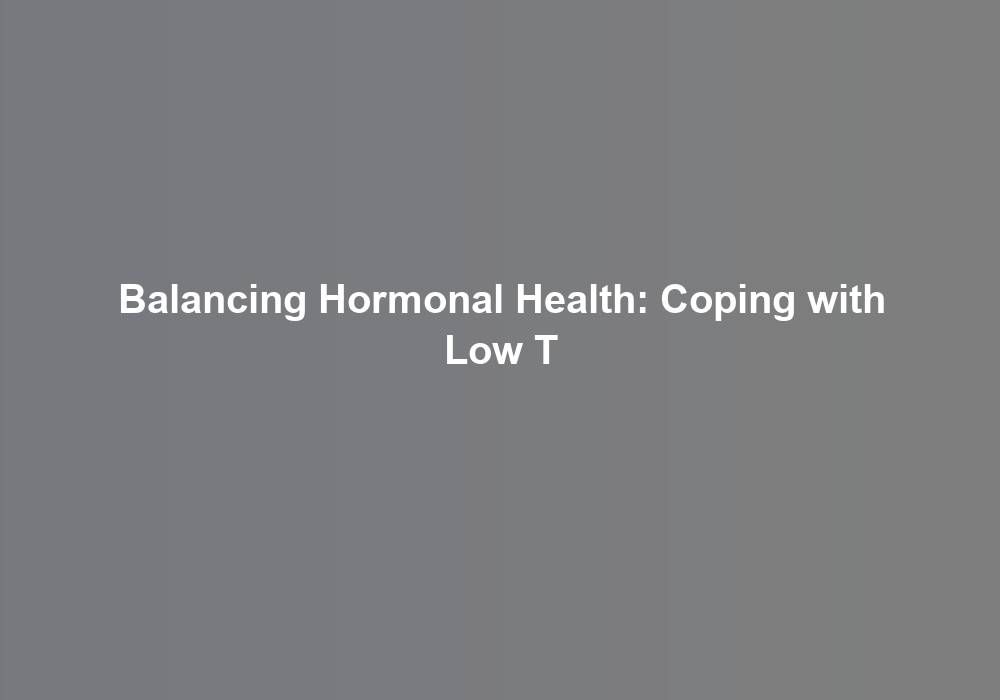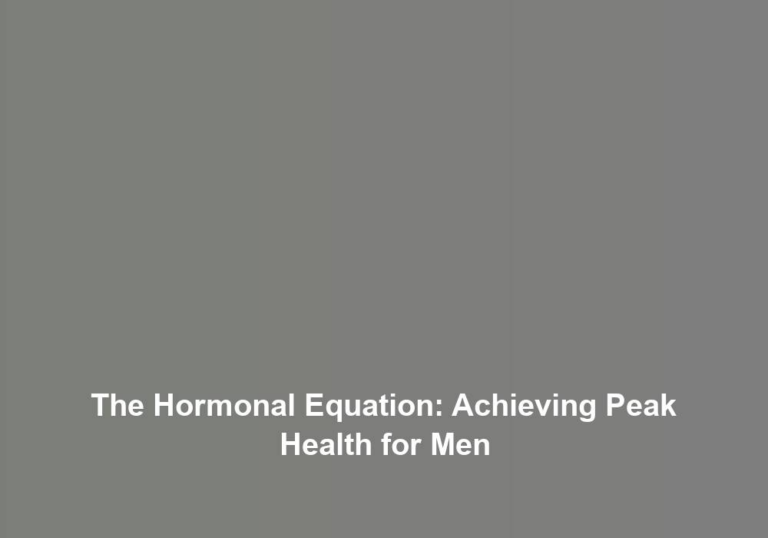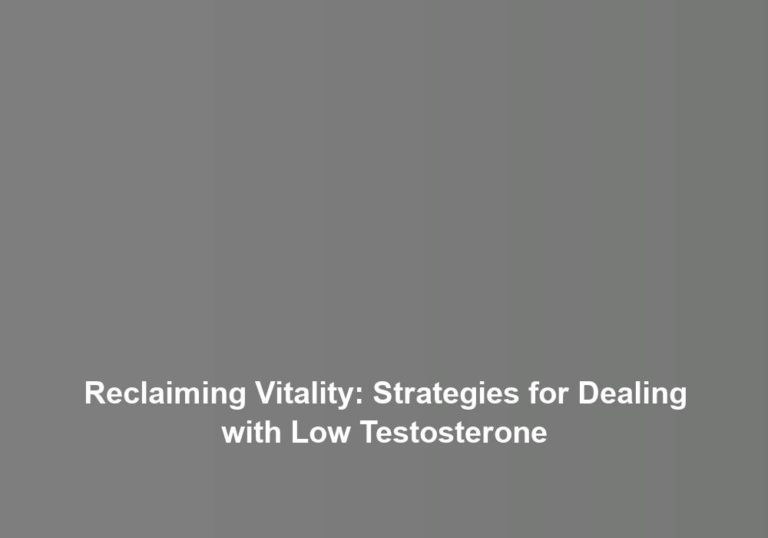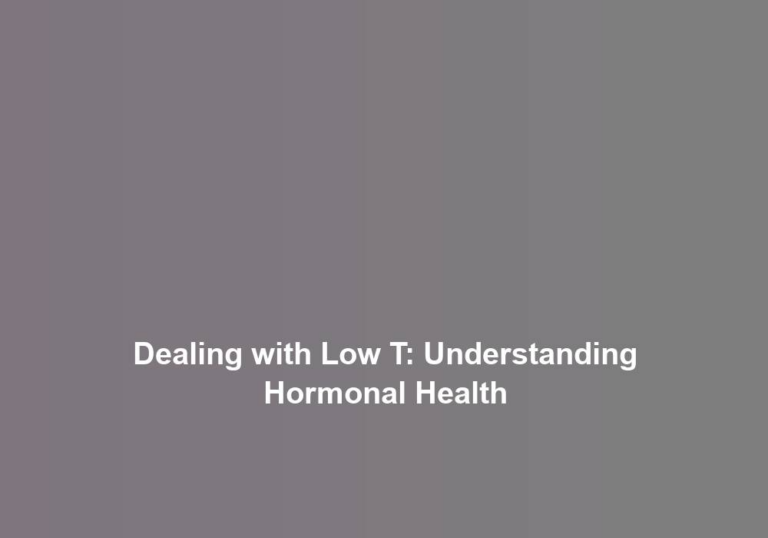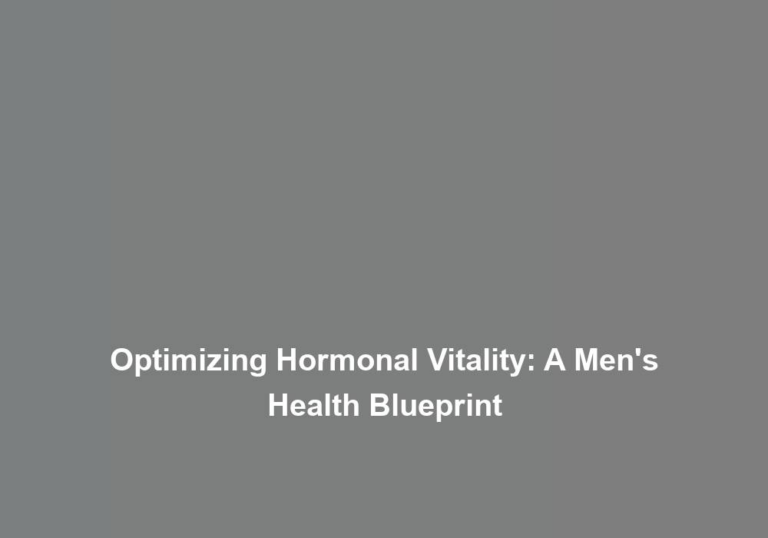Balancing Hormonal Health: Coping with Low T
When it comes to hormonal health, navigating the effects of low testosterone can feel like trying to steer a ship through turbulent waters. The impact of low T can be far-reaching, affecting not only physical well-being but also emotional and mental health. Whether youG??ve recently noticed changes in your body or have been struggling with symptoms for some time, understanding how to cope with low testosterone is crucial. In the following discussion, weG??ll explore the various aspects of balancing hormonal health, from recognizing the signs of low T to making lifestyle adjustments and seeking medical support. Understanding how to navigate this journey can make all the difference in reclaiming a sense of equilibrium and well-being.
Understanding Low Testosterone
If youG??re experiencing symptoms such as decreased sex drive, fatigue, and mood changes, it may be due to low testosterone levels, a condition that can impact various aspects of your health. Testosterone is a hormone that plays a crucial role in male health, influencing muscle mass, bone density, fat distribution, and red blood cell production. There are several causes for low testosterone levels, including aging, hormonal imbalance, certain medical conditions, and lifestyle factors such as obesity and chronic stress.
Low testosterone levels can have a range of effects on your body and overall well-being. In addition to the symptoms mentioned earlier, it can also lead to reduced muscle mass, increased body fat, and even erectile dysfunction. Furthermore, low testosterone levels have been associated with an increased risk of developing conditions such as osteoporosis and cardiovascular disease.
When it comes to treatment options, hormone replacement therapy is often used to address low testosterone levels. This treatment can come in various forms, including injections, gels, patches, and even implantable pellets. However, itG??s essential to consult with a healthcare professional to determine the most suitable option for your specific situation.
In addition to medical interventions, there are also natural remedies that can help boost testosterone levels. These include maintaining a healthy weight, regular exercise, ensuring adequate sleep, managing stress levels, and incorporating certain nutrients into your diet, such as vitamin D and zinc. ItG??s important to approach these natural remedies with caution and seek guidance from a healthcare provider to ensure they are appropriate for you.
Identifying Symptoms of Low T
Identifying symptoms of low testosterone involves recognizing signs such as decreased sex drive, fatigue, and mood changes, which can indicate potential hormonal imbalances impacting your overall well-being. Hormonal imbalances, particularly testosterone deficiency, can manifest in various ways, affecting both your physical and emotional health.
One of the most common symptoms of low testosterone is a decreased sex drive or libido. You may notice a reduced interest in sexual activity or experience difficulty achieving erections. In addition to this, persistent fatigue and a noticeable decrease in energy levels can also be indicative of low testosterone. You might find yourself feeling constantly tired or lacking the stamina to engage in activities you once enjoyed. Mood changes are another key indicator, with feelings of irritability, depression, or decreased motivation being potential outcomes of testosterone deficiency.
Physical manifestations such as decreased muscle mass, increased body fat, and even hair loss can also be linked to low testosterone levels. Furthermore, cognitive issues like difficulty concentrating and memory lapses may become apparent. ItG??s important to note that these symptoms can vary among individuals, and not everyone will experience the same set of manifestations.
If you recognize these symptoms in yourself, itG??s crucial to seek medical advice and have your hormone levels evaluated. Identifying and addressing testosterone deficiency can significantly improve your overall quality of life and well-being.
Lifestyle Changes for Hormonal Balance
To achieve hormonal balance, making lifestyle changes can play a significant role in addressing symptoms of low testosterone and improving your overall well-being. Dietary modifications and exercise routines are two key lifestyle changes that can positively impact hormonal balance. When it comes to your diet, focus on consuming a variety of nutrient-dense foods such as fruits, vegetables, lean proteins, and healthy fats. Incorporating foods rich in zinc, vitamin D, and other essential nutrients can support healthy testosterone levels. Avoiding excessive alcohol and processed sugar can also help in maintaining hormonal balance.
In addition to dietary modifications, engaging in regular physical activity is crucial for hormonal health. Aim for a mix of cardiovascular exercise, strength training, and flexibility exercises. Regular exercise can help regulate hormone levels, reduce stress, and improve body composition, all of which contribute to hormonal balance. ItG??s important to find activities that you enjoy and can incorporate into your routine consistently.
Medical Treatments for Low T
Consider consulting with a healthcare provider to explore medical options for addressing low testosterone levels. Hormone replacement therapy (HRT) and testosterone therapy are two common medical treatments for low testosterone. These treatments aim to restore hormonal balance and alleviate symptoms associated with low T. Here are some key points to consider when exploring medical treatments for low T:
-
Hormone Replacement Therapy (HRT): HRT involves the administration of hormones to supplement or replace the bodyG??s naturally occurring hormones. In the context of low testosterone, HRT may involve the use of testosterone and other hormones to restore hormonal balance. Your healthcare provider will assess your individual hormone levels and prescribe a tailored HRT regimen based on your specific needs.
-
Testosterone Therapy: Testosterone therapy specifically focuses on increasing testosterone levels in the body. This can be achieved through various methods, including topical gels, injections, patches, or implantable pellets. Your healthcare provider will monitor your progress and make adjustments to the treatment plan as needed to optimize testosterone levels.
-
Potential Risks and Benefits: Before undergoing hormone replacement or testosterone therapy, itG??s essential to discuss the potential risks and benefits with your healthcare provider. While these treatments can be highly effective in addressing low T, they may also carry certain risks, such as increased red blood cell count and potential impacts on prostate health.
-
Ongoing Monitoring: Regular monitoring of hormone levels and overall health is crucial when undergoing medical treatments for low T. Your healthcare provider will schedule follow-up appointments to evaluate your response to the treatment and make any necessary adjustments to ensure optimal results.
Support and Resources for Coping
Exploring available support and resources can be beneficial for individuals coping with low testosterone levels. Emotional support is crucial in managing the emotional impact of low testosterone. Connecting with friends, family, or support groups can provide a safe space to discuss feelings and concerns. Additionally, seeking professional counseling or therapy can offer structured support and coping strategies for navigating the emotional challenges associated with low T.
In addition to emotional support, holistic approaches can complement medical treatments for low testosterone. Engaging in regular physical activity and maintaining a balanced diet can contribute to overall well-being and may positively influence testosterone levels. Holistic approaches such as yoga, meditation, and acupuncture have also shown promise in reducing stress and improving hormonal balance. Exploring these alternative therapies under the guidance of qualified practitioners can provide individuals with a sense of empowerment and control over their hormonal health.
Furthermore, seeking out credible sources of information and resources related to low testosterone can equip individuals with the knowledge and tools to actively manage their condition. Reliable websites, books, and educational materials can offer valuable insights into the various aspects of low T, enabling individuals to make informed decisions about their health.
Conclusion
In conclusion, itG??s important to address low testosterone with a balanced approach. Did you know that studies have shown that men with low T are at a higher risk for developing cardiovascular disease? By understanding the symptoms and seeking medical treatment, you can take control of your hormonal health. With lifestyle changes and support from healthcare professionals, you can make positive changes to improve your overall well-being. Remember, you are not alone in coping with low T.

